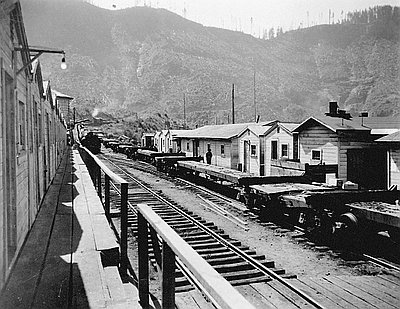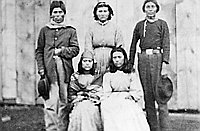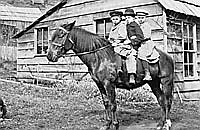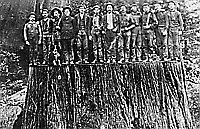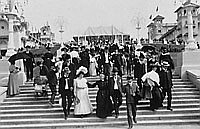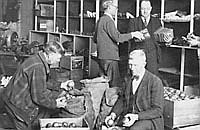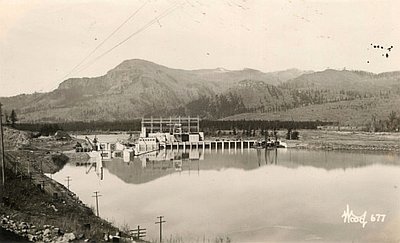Labor Struggles
The most significant influence of World War I on the Pacific Northwest is reflected in the changing course of labor relations. Shortly after the United States joined the Allies—England, France, and Russia—in their struggle against the Central Powers—Germany, Austria-Hungary, and Turkey—Northwest loggers and mill workers began striking for better wages, a shorter workday, and improved living conditions in the logging camps. The strike spread quickly through camps and mills until the industry was operating at only about 15 percent of capacity in the region.
Coos Bay Lumber Company workers struck briefly for higher wages. Management agreed to the workers’ demands, fearful that the strike would spread to its logging operations. Although the American Federation of Labor (AFL) had established few locals before 1917, the union movement gained momentum in the spring and summer of that year when both the AFL and the radical Industrial Workers of the World (IWW) stepped up organizing activities in the region. Disgruntled loggers and millworkers found the industry-wide organizing principles of the Wobblies attractive and joined the strike in increasing numbers.
The government intervened when Lt. Col. Bryce Disque of the Spruce Production Corporation, a unit of the U.S. Army headquartered in Oregon, ordered employers to institute an eight-hour day and improve conditions in the logging camps. With the full cooperation of the region’s lumber companies, Disque set up an industry-wide company union, the Loyal Legion of Loggers and Lumbermen (4-L). The 4-L took full advantage of the wartime emergency and the demands of patriotism to ban boycotts and strikes and mandated that workers sign loyalty pledges as a condition of employment.
Coincident with the creation of the 4-L, the U.S. government ordered a series of nationwide raids to round up IWW leaders on trumped-up charges of espionage and sedition. Victor Stevens, who worked for the Smith-Powers Logging Company in southwestern Oregon, remembers that the “IWW scare” meant clean bedsheets, warmer and bugfree bunkhouses, and improved medical care for injured workers.
World War I took domestic casualties beyond the government’s roundup of IWW leaders, especially those dissenters who questioned America’s involvement in the war. Oregon senator Harry Lane provides a striking illustration of a political figure who fell from grace because of his vote against the American declaration of war in April 1917. A Portland physician and Progressive reformer, Lane was elected to the U.S. Senate by the legislature in 1912. During his first term in office, he supported most of President Woodrow Wilson’s New Freedom reforms. He also backed the president’s re-election effort in 1916 but broke with the president early in 1917 over the Armed Ships Bill.
When Lane joined five other senators in opposing the declaration-of-war measure, the national and local press vilified the group as traitors and betrayers of their nation, recommending that they be driven from public office. Lane died in office on May 23, 1917, marking the close of a remarkable period of reform in the state’s political life, one that it would not occur again until the administration of Tom McCall in the 1960s and 1970s.
© William G. Robbins, 2002. Updated and revised by OE Staff, 2014.
Sections
Related Historical Records
Loyal Legion of Loggers & Lumbermen Pledge
This “specimen” of the “Four-L Pledge” was originally devised under the leadership of the U.S. War Department’s Col. Brice P. Disque as part of a larger strategy to …
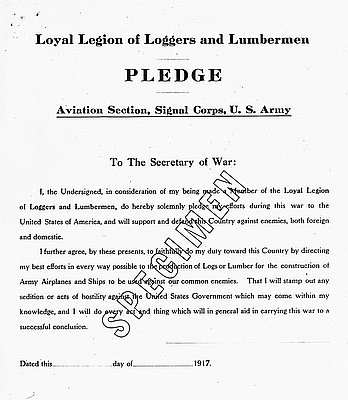
Shipbuilding, World War I
The shipyards at Grant-Smith-Porter Ship Co. still show considerable activity just after WWI. Wartime shipbuilding provided a bright exception to Portland’s otherwise lackluster economy during the First World …
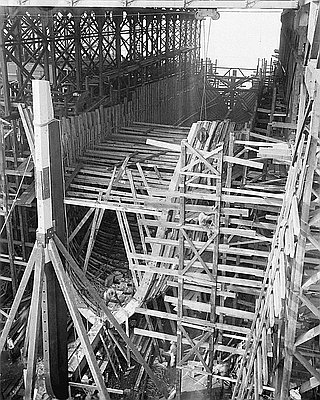
Camp Two, Coos Bay Lumber Company
A moving community of loggers is depicted in this 1930 photograph. From the 1890s through World War II, major logging operations in Oregon were railroad-based, with trackage extending …
